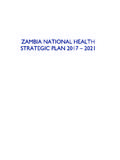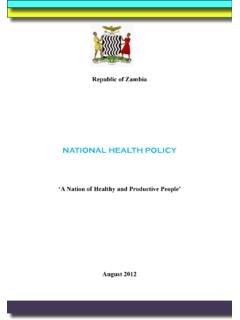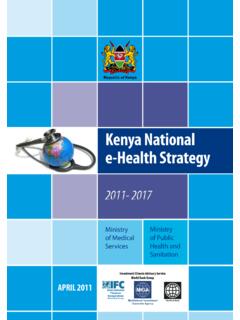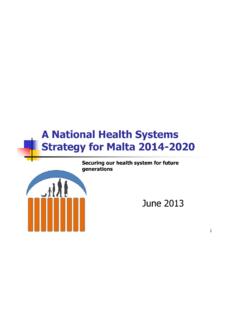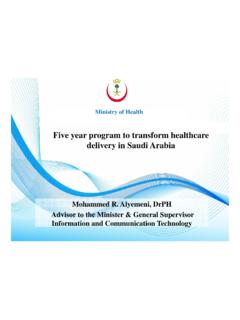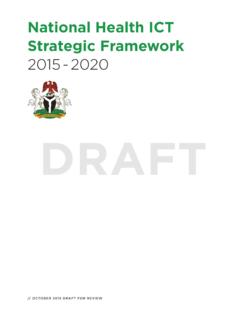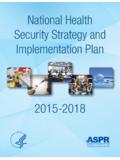Transcription of Republic of Zambia Ministry of Health
1 I Republic of Zambia Ministry of Health e- Health strategy 2014-2016 DECEMBER, 2013 ii TABLE OF CONTENTS III ACKNOWLEDGEMENT ..IV ACRONYMS .. V BACKGROUND .. 1 INTRODUCTION .. 1 PROBLEM STATEMENT .. 2 SITUATIONAL ANALYSIS .. 2 STRATEGIC FOCUS .. 7 VISION .. 7 MISSION .. 7 GUIDING PRINCIPLES .. 7 STRATEGIC PRIORITIES .. 9 INFORMATION SYSTEMS .. 10 TELEMEDICINE .. 12 M- Health .. 12 E-LEARNING .. 13 CAPACITY BUILDING .. 14 Health PROMOTIONS .. 15 MONITORING AND EVALUATION .. 15 IMPLEMENTATION FRAMEWORK .. 16 POLICY AND REGULATORY FRAMEWORK .. 16 LEGAL REFERENCES .. 16 INSTITUTIONAL AND COORDINATION FRAMEWORK.
2 16 9. 0 MONITORING AND EVALUATION .. 17 E- Health LOGIC MODEL .. 17 E- Health LOGIC MODEL .. 18 MONITORING PROCESSES, SYSTEMS AND TOOLS .. 20 ANNEXES .. 21 A. KEY PERFORMANCE INDICATORS .. 22 B. LOGICAL FRAMEWORK .. 23 C. BUDGET FOR IMPLEMENTATION OF E- Health strategy .. 28 D. LIST OF PARTICIPANTS TO THE E- Health strategy .. 29 E. GLOSSARY OF TERMS .. 30 iii FOREWORD The Government of the Republic of Zambia aims to deliver the highest quality of healthcare services to its citizenship. To this effect, it has, among other interventions, embraced the use of Information and Communication Technology (ICT) in its service delivery channels.
3 Information and Communication Technologies have, over the past few years, significantly impacted many aspects of society and has the potential to impact positively on the delivery of Health care services. The development of the national e- Health strategy comes at a critical moment when the ability of ICTs to support and transform Health care has been widely recognised. In Zambia , e- Health plays a central role in facilitating the harmonisation of the previously fragmented and disjointed systems and approaches in implementation and maintenance of Health initiatives. The purpose of the strategy is to use ICTs to leverage service delivery by creating a conducive environment for successful implementation of e- Health systems.
4 It is anticipated that once this e- Health strategy is implemented, it would enhance sustainability of ICT integration and would be factored in the implementation of Health initiatives thereby reducing external dependency in ICTs. In addition, it would also assist in utilising the available staff prudently through the use of ICTs. At the national level, the importance of ICT in national development was demonstrated by the launch of the national ICT Policy in 2007 and the inclusion of ICT as a priority sector in the Fifth national Development Plan 2006 - 2010. An opportunity has now arisen for the country to implement the e- Health strategy and therefore all stakeholders are called upon to rise to the challenge.
5 The need for the government to develop its e- Health strategy that guide the Health sector and regulate the use of its ICT resources could not be over emphasised. The e- Health strategy therefore will give well defined guidelines in the manner in which all issues relating to ICT will be managed. It is my considered view that, with appropriate levels of commitment and support from the Government, Health workers, Cooperating Partners (CPs) and other key stakeholders, the strategy would significantly improve the management of the public Health sector and lead to improvement of the Health status of Zambians that will significantly contribute to national development.
6 I therefore, urge all stakeholders involved in the implementation of the e- Health strategy to fully educate themselves to this important document. The Ministry is fully committed to ensuring the successful implementation of the strategy . Hon. Dr. Joseph Kasonde, MP MINISTER OF Health iv ACKNOWLEDGEMENT The e- Health strategy has been developed through an interactive, participative and consultative process involving significant contributions and support from various individuals and institutions. I therefore wish to extend my sincere appreciation to all those that contributed to the process of developing it. On behalf of the Ministry of Health , I also wish to acknowledge the financial and technical support rendered to us by our Cooperating Partners in supporting this process.
7 Without the direction and valuable support of our Cooperating Partners and other line ministries, we would not have managed to successfully complete this document. Finally, I wish to thank all members of staff of the Ministry of Health for their participation, contributions and support to the process of formulating this e- Health strategy . Dr. Peter Mwaba Permanent Secretary Ministry OF Health v ACRONYMS CDC Centre for Disease Control & Prevention CHAZ Churches Health Association of Zambia CIDRZ Centre for Infectious Disease Research in Zambia CPs Cooperating Partners DHIS District Health Information System DMO District Medical Office EID Early Infant Diagnosis GIS Geographic Information System GNC General Nursing Council GRZ Government of the Republic of Zambia HIV/ AIDS Human Immune Virus/ Acquired Immune Disease Syndrome HMIS Health Management Information System HPCZ Health Professionals Council of Zambia HR Human Resource HRH Human Resources for Health HRIS Human Resources Information
8 System ICT Information and Communications Technology IEC Information Education and Communication JSI John Snow Inc USAID| Deliver Project LAN Local Area Network LIS Laboratory Information System LMIS Logistics Management Information System M & E Monitoring & Evaluation MCDMCH Ministry of Community Development Mother and Child Health MESVT Ministry of Education Science Vocational Training and Early Childhood MoF Ministry of Finance MoH Ministry of Health MSL Medical Stores Limited MTWSC Ministry of Transport, Works, Supply and Communications NAC national Aids Council NCDs Non-Communicable Diseases NHRA national Health and Research Authority PCR Polymerised Chain Reaction PMO Provincial Medical Office STI Sexually Transmitted Infection TB Tuberculosis VCT Voluntary Counselling and Testing VoIP Voice Over Internet Protocol WAN Wide Area Network WHO World Health Organisation ZDHS Zambia Demographic Health Survey ZMA Zambia Medical Association ZPCT Zambia Prevention and Care Treatment ZUNO Zambia Union of Nurses 1 BACKGROUND The Government of the Republic of Zambia (GRZ)
9 Is committed to delivering better and more practical measures that will ensure the uniform growth of Information and Communications Technology (ICT) in all sectors. Government Ministries are expected to take the lead thereby enabling stakeholders and the public to benefit from quick accessibility of accurate data and information. In March 2007, the national ICT Policy was launched by the then President of the Republic of Zambia , Dr. Levy Patrick Mwanawasa. The national ICT Policy provides the guiding principles around which sector ICT policies should be developed. It therefore became necessary for each sector of the Public Service to formulate its own ICT Policy as a conduit for implementing the national ICT policy.
10 The Ministry of Health (MOH) has included a chapter on ICT in the MOH national Policy that was launched in September 2012. Other Government documents that have been consulted in developing the e- Health strategy include: the Vision 2030; The Fifth national Development Plan (2006-2010) as well as The Sixth national Development Plan (2011-2015); the national Health Strategic Plan (2006 - 2010) as well as the national Health Strategic Plan (20011 - 2016) and the Ministry of Health Institutional Strategic Plan 2005 2009. The Ministry of Health has a number of ICT operational guidelines for different information systems. However, in some areas of ICT application, there have been no guidelines.
